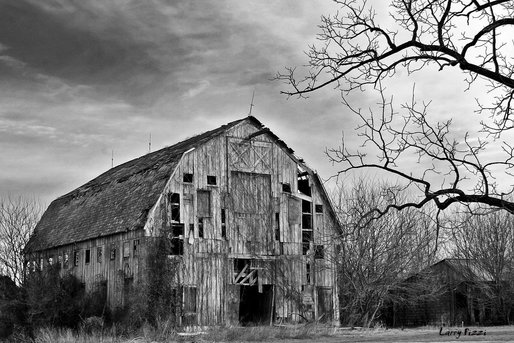 (c) 2017 Larry Pizzi (c) 2017 Larry Pizzi Then he told them a parable. “There was a rich man whose land produced a bountiful harvest. He asked himself, ‘What shall I do, for I do not have space to store my harvest?’ And he said, ‘This is what I shall do: I shall tear down my barns and build larger ones. There I shall store all my grain and other goods and I shall say to myself, “Now as for you, you have so many good things stored up for many years, rest, eat, drink, be merry!” But God said to him, ‘You fool, this night your life will be demanded of you; and the things you have prepared, to whom will they belong?’ Thus will it be for the one who stores up treasure for himself but is not rich in what matters to God.” (Luke 12:16-21) 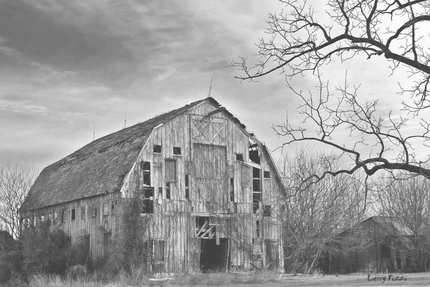 One of my favorite Instagram hashtags is #ipulledoverforthis. There is something almost mystical in seeing a photograph before it's taken. I photographed this barn six years before Instagram launched. The hashtag fits perfectly, though. How could I not pull over to take this picture? Some months later, I decided to photograph it again. When I got there I stared in silence. It was gone. Not a board or a shingle left, just a large patch of earth, scraped clean. Whenever I see an abandoned or derelict building, I imagine the owner and family standing at a distance and beaming with pride on the day of its completion. Someone must have had a tremendous feeling of accomplishment on the day this barn was finished. Yet, today, all that remains of this titanic accomplishment is a patch of earth, the same earth to which the builder and the owner are probably consigned as well. 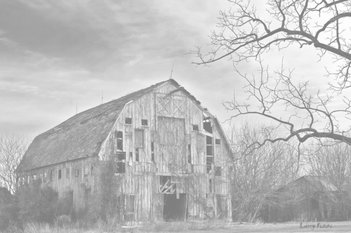 There's nothing wrong with taking pride in work well done. There’s nothing wrong with striving for bigger and better things. The man in the parable is deemed a fool not for being rich or for building bigger barns but for being self-centered. It’s all about perspective. The rich man had a flawed and narrow outlook. If one's outlook is broader, there is a place for pride. Such a perspective must not only see the accomplishment but also a realistic vision of its place in life and its effect on others. Such a vision paradoxically produces pride wrapped in humility. After all, humility is nothing more than the result of being realistic. 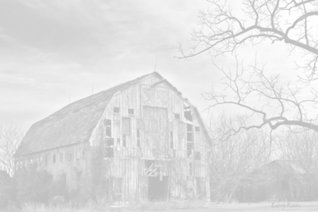 A true example. I retired from the Army as a lieutenant colonel. At the apex of my career I had all the perks of my rank. I was an important person and had a few medals on my chest prove it. Today, if I went back to my last duty post, I could not get in the front gate. The fact that I once was important on the other side of that gate counts for nothing. (I would have to root around in the attic to find the medals.) It's fine to strive to build a bigger barn and to be proud of it, as long as I also realize that someday neither the barn nor I will be as significant as we are today. This outlook need not be as depressing as it sounds. It is actually quite liberating. The point of the parable is not the death of the rich man but the joy and contentment of those who live their lives with a view wide enough to include people and things that are important beyond themselves.  It seems to me that these days, more than ever, we need a vision of our lives that includes others, especially the marginalized, the poor, the lonely, and the vulnerable. So go ahead. Build a bigger barn. And when you've done so, look at it with pride. But look widely enough to see those in need and far enough to see the ultimate end of the barn. And while you're at it, consider sharing some of that bounty rather than storing it away. Including what truly matters in our vision, caring for all, especially those who need us most, will, as Maximus Decimus Meridius says, echo in eternity. The barn, as impressive as it is, will eventually fade away. (c) 2017 Larry Pizzi
0 Comments
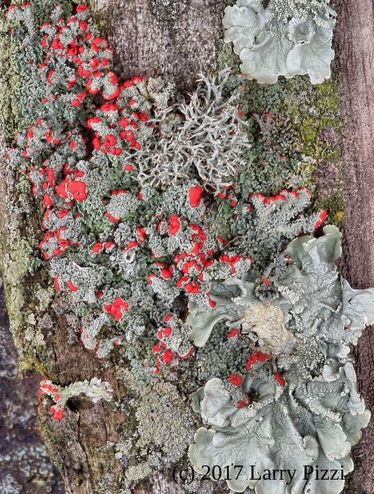 (c) 2017 Larry Pizzi (c) 2017 Larry Pizzi Recently, I had to replace our mail box. The wooden box in the shape of a house and more than 50 years old was on life support, held together with caulk and an assortment of mismatched screws. More than once I'm pretty sure I got a “look” from the letter carrier indicating that a new box was past due. Before I tore the remains of the wood from the old box, I gingerly removed one of the roof slats to preserve it. For more than a dozen years, the lichen growing on this rotting wood had made me smile each time I collected the post. You can see why from the photo. This red-tipped lichen goes by many names: match heads, matchsticks, Bengal matches, the devil's matches, and my favorite, gritty British soldiers. While I certainly like the colors and shapes of the lichen, what makes me smile is its persistence over a dozen years of heat, drought, rain, snow, sleet, ice, hail, and temperatures well below freezing. It has survived many schoolchildren careening down the sidewalk and several times when I grabbed the box and held on, clumsily trying to get the mail while negotiating a snow bank. No matter what the circumstances, it was always there to greet me, colorful and seemingly indestructible. A survivor.  Click photo for source. Click photo for source. While photographing the lichen taken from the mailbox, I was reminded of words often but mistakenly cited as the motto of the US Postal Service. The familiar words are cut into the granite facade of Manhattan's James Farley Post Office, built in 1912: Neither snow, nor rain, nor heat, nor gloom of night stays these couriers from the swift completion of their appointed rounds. (Free trivia: These words are a pretty good translation of the ancient Greek historian, Herodotus, in the 5th century B.C. describing the marvels of a Persian system for delivering important messages. Mark Twain used similar words to describe the Pony Express in 1877.) The rotting mailbox, the lichen, and the words cut into granite came together as I framed the picture: survive, persist, prevail, endure, and while at it, give someone a reason to smile. I am not an extraordinary person. I've had my share of trials, but who hasn't? I lost my twelve-year-old son to cancer, had cancer myself, had an accident that limited my walking ability for life. But these are not uncommon; they pale compared to the horror and tragedy that many of the Earth's inhabitants have endured and continue to endure. I am a most blessed person compared to many. Rain, snow, heat and gloom of night do not deter the lichen. It isn't just surviving. As it survives, it also contributes beauty and marvel. It catches my eye and makes me smile. It gently reminds me not only to persist but also to bring some good to the world around me.  Click photo for source. Click photo for source. In his tale, “The Naval Treaty.” Sir Arthur Conan Doyle jars the reader when Sherlock Holmes, at a tense moment, plucks a flower from an arrangement and delivers a very uncharacteristic soliloquy about, of all things, religion: "Our highest assurance of the goodness of Providence seems to me to rest in the flowers. All other things, our powers our desires, our food, are all really necessary for our existence in the first instance. But this rose is an extra. Its smell and its colour are an embellishment of life, not a condition of it. It is only goodness which gives extras, and so I say again that we have much to hope from the flowers." For me, the lichen on our old mailbox is “an embellishment of life,” beauty as well as survival. My task, I think, is to find ways to be an embellishment in the “appointed rounds” of my life, to find hope in and to bring a measure of goodness to others from the circumstances of daily life. Thoughts? Leave a comment. P.S. The lichen is doing quite well in it’s new spot as it continues to spread about the remains of my old mailbox. 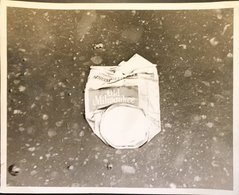 According to the results of an internet search, the number of blogs in the world is somewhere between 1.4 bazillion and 2.2 gagillion. That's right. Nobody really knows how many blogs exist. One infographic placed the number at 152 million in 2013. Another site has a cool counter, merrily counting away the number of blog entries made per second. So why one more? The answer lies partly in a crushed beer can and partly in a Southern gentleman professor. I have very few childhood memories, but I can’t remember a time when I was not fascinated with cameras. I was snapping pictures, developing film, and printing photos by the time I was 12. I have a vivid memory of the first “abstract” picture I ever took. Until that day my pictures were exclusively of people or scenery--snapshots. For some reason, I photographed a crushed beer can in a mud puddle. That was 1967. I was 14 and I was hooked. Photos could inspire a story, could spark the imagination. Fast forward to 1980. I was in grad school, working on a masters in English at the University of North Carolina. I was taking a course from a true relic of the Old South, right out of Gone With the Wind. In discussing a minor poet, he mentioned the words “commonplace book.” I looked it up. I was hooked again. I would keep such a book.  I'm not a very disciplined or industrious person. In 64 years, I can only count two things that I've done consistently: take pictures (for more than 50 years) and keep a commonplace book (more than 35 years). In the years of doing these two things, I've never stopped to ask, "What was I thinking?" What was I thinking when I released the shutter? Why did I stop what I was doing and take the time to preserve a bit of wisdom, a quotation, a cartoon, a random thought? What might the answers to these questions tell me about myself, about others, about the world? I’m seeking travelling companions, much like Robert Frost did in inviting his readers to join him and experience the first American publication of his poetry, North of Boston, with a simple but profound little poem, "The Pasture," part of which reads-- I’m going out to clean the pasture spring; I’ll only stop to rake the leaves away (And wait to watch the water clear, I may): I sha’n’t be gone long.—You come too. Unlike Tom Sawyer, Frost was not trying to dupe someone into doing his work for him. There’s a certain amount of loafing involved in the unnecessary task of watching water clear. Better to loaf with a friend than be just lazy alone. He extends the invitation for the sheer pleasure of friendship, fellowship, and perhaps mutual benefit.  It’s as if he’s saying, “No heavy lifting, but surely we’ll benefit from our time together. Who knows what we might discover?” That’s my invitation to anyone who might follow, comment, and add immensely to what otherwise would be a lonely and self-centered journey. Most importantly, I 'd really enjoy your company. You come too! |
Larry Pizzi50 years of photographs and 35 years of keeping a commonplace book. Archives
March 2018
Categories |

 RSS Feed
RSS Feed